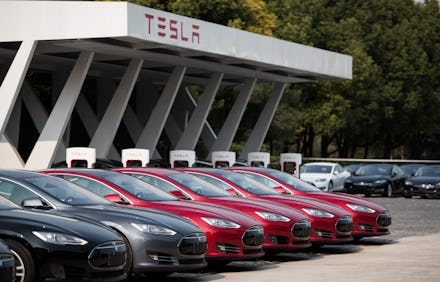Tesla Death Is the First While Using Autopilot — But Don't Freak Out Just Yet

A man died in a self-driving car, the innovation presented to us humans as the metal chamber with which we should trust our lives. While this may be fear fuel for the many still nervous about driverless cars, it doesn't mean the future of autonomous roads is doomed.
Here's what we know: A driver was killed in a Tesla Model S when the electric sedan was in autopilot mode, the New York Times reported, which marks the first known fatal accident involving a self-driving vehicle. The Model S was hit by a tractor trailer on the highway.
"Neither autopilot nor the driver noticed the white side of the tractor trailer against a brightly lit sky, so the brake was not applied," a Tesla Motors news release said.
The driver —Joshua Brown — previously recorded a video of his Tesla autopilot saving him from a collision. The video received more than 2 million views on YouTube.
Why you shouldn't be scared: This driverless car accident proves that these autonomous systems are not flawless — but it doesn't mean they are more flawed than human drivers. Nearly 1.3 million people die in car accidents each year worldwide, according to the Association for Safe International Road Travel, with about 3,287 deaths a day.
"Unless action is taken, road traffic injuries are predicted to become the fifth leading cause of death by 2030," ASIRT says on its website.
Volvo pledged that by 2020, no one will die or be seriously injured in one of its vehicles.
"With the development of full autonomy we are going to push the limits of automotive safety," Volvo safety engineer Erik Coelingh told CNN Money, "because if you make a fully autonomous vehicle you have to think through everything that potentially can happen with a car."
The fatal accident in the self-driving Tesla does raise concerns about software oversights or glitches — but it's the "first known fatality in just over 130 million miles where autopilot was activated," the Tesla team wrote, which is still far superior to human error.
Volvo, along with Tesla, Ford, Google, Toyota, Nissan, General Motors, Audi and more are all gearing up to unleash their fleets of driverless cars in the near future.
Autonomous roads are coming.
Now we know driverless cars aren't perfect. We are still grappling with whether or not the car should be programmed to decide who lives or dies in the event of an unpreventable crash. And a road filled by internet-connected devices makes itself vulnerable to a cyberattack.
But one fatality is not a huge setback for driverless vehicles. Statistics show 94% of annual traffic fatalities are attributed to human error, Phys.org reported. The machines are still a hell of a lot safer and more efficient than flesh and blood.
"As more real-world miles accumulate and the software logic accounts for increasingly rare events, the probability of injury will keep decreasing," the Tesla news release said. "Autopilot is getting better all the time, but it is not perfect and still requires the driver to remain alert. Nonetheless, when used in conjunction with driver oversight, the data is unequivocal that autopilot reduces driver workload and results in a statistically significant improvement in safety when compared to purely manual driving."
Read more: